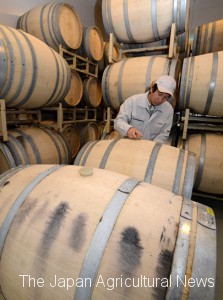
Yamabe Winery uses only locally-grown grapes. Their wines enjoy high reputations at international wine shows. (in Matsumoto city, Nagano Prefecture)
NAGANO, June 24 — The Japan-Europe EPA talks regarding a plan to cut tariffs on European wine have emerged, raising tensions in wine producing regions in Japan. “Authentic” wines from Europe with high brand power inevitably compete with Japanese wines price wise, and an increase in European wine import may shave the demand for domestically-made alcoholic beverages such as Japanese sake and shochu (locally-distilled spirits) as well in the country with the nation drinking increasingly less alcohol. Japanese wine producers have been placing extremely high expectations on the role of Japanese wines in the development of the sixth industrialization for an increase in agricultural income. The domestic wines are already contributing to local economies and tourism, and related parties have strong concerns over the impact of the free entry of European wines to Japan.
“Eighty percent of Japanese wines are sold in the same price range with European wines. There will be a considerable impact,” said Michihiro Ichikawa, manager of Yamabe Winery in Matsumoto city, Nagano Prefecture, expressing his anxieties. The winery is part of Budo-no-Sato-Yamabe, a subsidiary of an agricultural cooperative in Nagano Prefecture, JA Matsumoto Highland and produces approximately 80,000 bottles of wines (in 720-ml bottles) a year using only locally-grown grapes. The impact on its wine sales will directly hit local grape producers.
Nagano Prefecture has many other wineries with a strong focus on the use of locally-grown grapes. The prefecture is the largest producer of wine grapes in Japan. According to the survey of National Tax Agency in 2015, 92% of 6,704 tons of Nagano-made wine grapes are consumed to make wines in the prefecture.
In Japan, only large-scale winemakers import juice to make wines but most of the wineries in Japan are small locally-based companies that grow grapes on their own. So it’s hard for them to cut cost.
Budo-no-Sato-Yamabe rents a 1.3-hector vineyard from a retired farmer to grow grapes for their wines. It also purchases non-standard grapes from local farmers to support their income. “We never want a price war to begin in Japan,” he said.
Yamabe Winery has a restaurant and farmers’ market with 200,000 visitors a year. The facility with total sales of 380 million yen has a broad impact on local farmers and job market. The elimination of tariffs on European wines will inevitably harm local economies.
Some also say that the import will help broaden the wine market in Japan, but Takashi Kikuchi, executive managing director of Hayashi Winery in Nagano Prefecture and president of Nagano Prefectural Wine Producers Association, stressed, “This will never benefit wine producers and industry.” The number of domestic alcoholic drinkers is declining, and the free trade of European wines, which are already popular in Japan, “will result in a fall of consumption of Japanese wines, and also sake and shochu,” he said.

